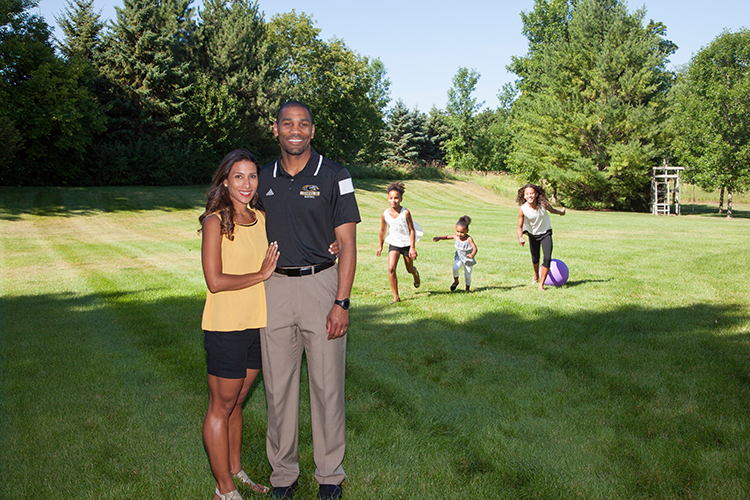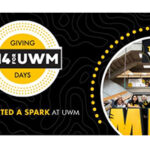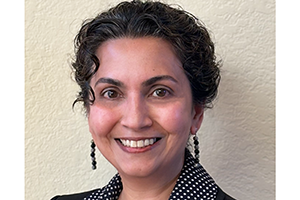LaVall Jordan’s life changed on a Wednesday night at a suburban Milwaukee Outback Steakhouse. His wife, Destinee, was calming down the couple’s three children when Jordan received a phone call from UWM Chancellor Mark Mone. It took her only a few minutes to realize the significance.
“He got this big grin, and he looked me in the eye,” she remembers. “I knew then that he was offered the position.”
The job in question was head coach of UWM’s men’s basketball team, leading a program whose history dates to 1896.
Jordan had been a top assistant at the University of Michigan for six years, coaching the Wolverines in five NCAA Tournaments and the 2013 national title game, with prior stops at the University of Iowa and Butler University. He’d graduated as the winningest player in Butler history and was about to move into a top coaching job days before his 37th birthday.
“It happens fast,” he says.
What happened next went even faster. Jordan shared the news with Michigan head coach John Beilein, who reminded him that he was ready and told him to have fun. He met with UWM Athletic Director Amanda Braun the next morning, April 8, when his hiring became official. Phone calls and text messages from former colleagues, players and teammates poured in. By Friday morning, he was on UWM’s campus, meeting Panthers players and getting to work.
At a news conference that afternoon, he stood behind a lectern decked out in his new school’s colors, a gold necktie accenting his black suit. Destinee, their children and Jordan’s parents, Nate Mitchell and Karen Jordan, were in the front row.
Karen Jordan has lived in Milwaukee for more than a decade. When a reporter asked her son about that, she answered the question for him. A brief conversation between mother and son ensued, with him playfully concluding: “What we’re not gonna do is give her the microphone.”
After the news conference, the new face of Panthers basketball recorded a video message for UWM fans, introducing himself as Coach Val. “We’re happy to be in Milwaukee, and we’re thrilled to be Panthers,” he said, surrounded by Destinee and daughters Ava, Alanna and Adalynn. They were all smiles as he made sure Panthers fans knew each by name.
Yes, for Coach Val, family matters.
***
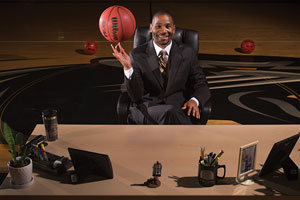
LaVall Jurrant-Lige Jordan grew up in the small, south-central Michigan town of Albion, a working-class enclave where he was one of 107 students in his high school graduating class. He was the star guard on Albion High School’s 1997 state finalist team, which lost the title to future NBA champion Shane Battier’s powerhouse from Detroit Country Day. Jordan played that game wearing a face mask to protect a broken nose. Challenges and underdog labels are nothing new.
He was raised by family in the broadest sense, not just by mom and dad, but also by an aunt and uncle, grandmother and grandfather. At various points during his upbringing, Jordan lived with them all. Each had an impact in different ways, and all held him accountable. “I had to do certain things to be able to have freedom,” Jordan says. “If I didn’t do them, I didn’t get the freedom.” And if his grades weren’t good enough, he would not play basketball.
His uncle, Lige Ridley, insisted on driving him to classes every morning rather than let him take the school bus. His aunt, Jetha Jeffers, was a landlord who had him mow lawns and tend gardens at her properties, often ending his procrastination with a simple statement: The dreading is worse than the doing. “I tell that to my daughters now,” Jordan says.
Always implicit was the message that Jordan’s actions represented his family, and that his accomplishments, or mistakes, reflected on his community. It’s a lesson he carried with him to Butler and beyond.
In many ways, Butler is where Jordan became the man he is today. Not just because of basketball, important though it was. He won 91 games there from 1997-2001, more than any previous Butler player, and went 9-0 against then-league rival UWM. In 2001, he led the Bulldogs to their first NCAA Tournament victory in 39 years, and later, Butler’s Todd Lickliter gave Jordan his first coaching gig.
But the biggest impact Butler had on Jordan was personal: It’s where he met Destinee. “He says I was his best recruiting job ever,” she explains.
They were introduced by mutual friends in 2001, just three weeks before he was to go play pro basketball in Europe. She was initially skeptical of a relationship, but Jordan made quite an impression during those 21 days. On the day he left for Europe, he told her he loved her, and in between a string of phone calls and emails, she flew overseas for a visit. Their love lasted through his pro season in Europe and his return to the United States to begin coaching. They married in June 2004.
Both adjusted to the lifestyle inherent in the coaching profession, one marked by relentlessly busy work schedules and unusual demands on personal time. “I remember coming home one time,” Jordan says, “and I don’t know what I was saying, but she told me, ‘I’m not one of your players. You don’t need to coach me.’”
Their family grew with his coaching career, first at his alma mater, then at Iowa from 2007-10, and then on to Michigan. While Jordan was on the bench as Michigan played for a national title in 2013, Destinee was in the stands with daughter Adalynn, who was only 3 months old. “We joke all the time,” Destinee says, “that he has sons in his job and the ladies at home.”
***
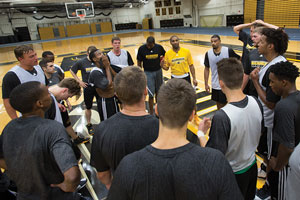
“You do,” Jordan admits, “end up with two families. You have your basketball family, and your family at home.” But, he says, they need not remain separate entities. “You merge them.”
The evidence is right there on his phone. He holds it up and goes to his photo gallery, swiping through the snapshots. There is a scene from that April dinner, taken minutes before Mone called with the job offer. Other photos show the basement of his home in Ann Arbor, Michigan, where All-Big Ten Wolverines point guard Derrick Walton Jr. is reading books with Jordan’s children.
The connections stretch across every team he’s been a part of. Jordan is still close to Glen Korobov, who was on the Butler staff during Jordan’s playing days. “He still texts me Bible Scripture every day,” Jordan says.
It’s that type of kinship that Jordan is determined to create with the teams he coaches at UWM, one that fosters relationships that last not just for a season or a career, but for a lifetime.
“You want guys to have that great experience,” Jordan says. “The daily interactions and relationships make that experience for them. The winning makes it, too, but it’s always been about the players for me. You know it’s going to be tough. You’re going to have to grow through some things, but you only get it once, that college experience.”
He knows it can happen at UWM – the friendships and camaraderie, the excitement and the winning – not just because he’s seen it before, but because it’s happened at UWM before, too.
“It’s not like you’re trying to do something here that’s never been done,” Jordan says. He rattles off the names of former Panthers coaches Bo Ryan and Bruce Pearl and Rob Jeter, and notes that he has big shoes to fill. “You respect it,” he says. “That was one of the things that drew me. We’ve seen it here before.”
He wants to see it again, to make new memories for players and fans that mirror those he had at Albion, Butler, Iowa and Michigan. He remembers the struggles and the successes, the heartaches and the happiness, the hard work and the fun times, the basketball families and the family at home.
“All that lines up,” Jordan says, and he pauses a bit, “and then you get a phone call.”
And it leads to a new family.
